Crypto prices started the week recovering from the selloff of the week before after yet another US commercial bank, the First Republic Bank, was rumored to be facing an existential crisis. This pushed the price of BTC back to $30,000 again before a sudden and quick selloff reminiscent of the week before happened again. This time around, however, there was at least a notable reason for the selloff – a whale movement tracker notified several of its hedge fund subscribers that the wallets of the US Government which held around 205,514 BTC and the custodian account of the Mt Gox Creditors which contained around 137,890 BTC had shown movements. This quickly caused panic in the markets, where the notified hedge funds sold their positions and even shorted the market down, causing a downward spiral which caused the price of BTC to crumble 10% within minutes back down to $27,200.
ETH and altcoins surprisingly, did not suffer a worse drawdown – their percentage losses were similar to that of BTC, which showed that most of the dumping activity was on BTC.
However, about an hour later, it was revealed that the whale alert was an error caused by a system bug and that those two whale wallets did not have any movement – meaning to say that they did not sell any BTC. This revelation managed to stop the price of BTC from declining further.
The two-way movement liquidated around $300 million worth of positions within a 12-hour period, with the amount of long liquidations slightly higher than short liquidations as was expected since the fall was steep and sudden.
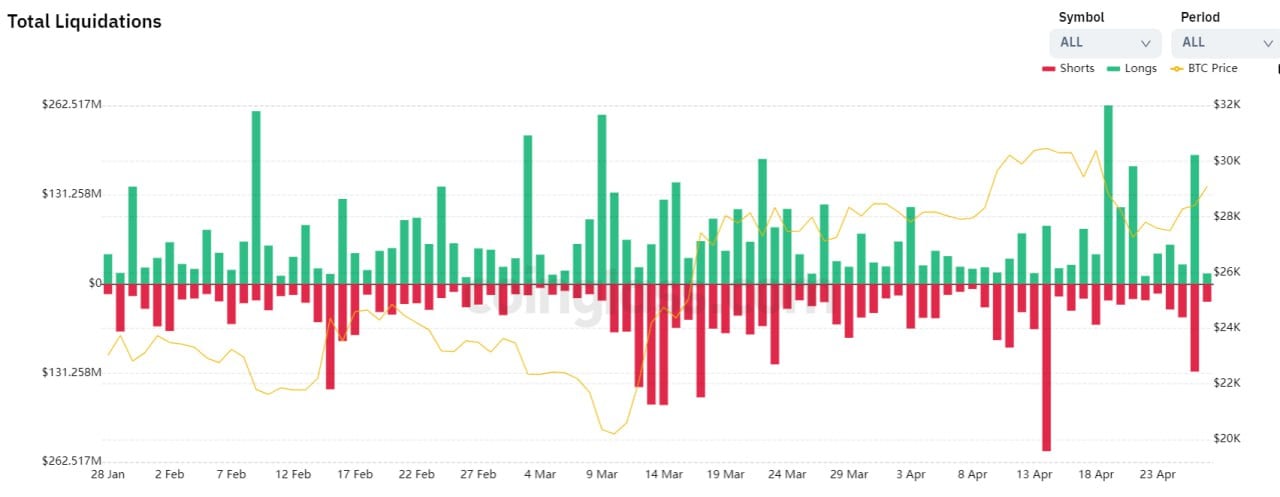
The clarification of the false alarm managed to salvage some ground for BTC, which stopped declining further. However, a recovery proved to be difficult as BTC failed to find momentum to revisit $30,000 again and is even finding trouble holding on to $29,000 as the new week begins.
Whales back accumulating while retail traders turn bearish
With the decline in price last week, some whale purchase activity has returned to BTC. A group of whales who sold BTC on 11 April when the price was above $30,000 are back quietly accumulating BTC again.
Addresses holding between 100 to 10,000 BTC have collectively added almost 30,000 BTC to their bags last week, entering the market to buy when BTC dipped to below $28,000 on 26 April. This group of whales have added 64,094 BTC back over the past 16 days since reducing their bags on 11 April.
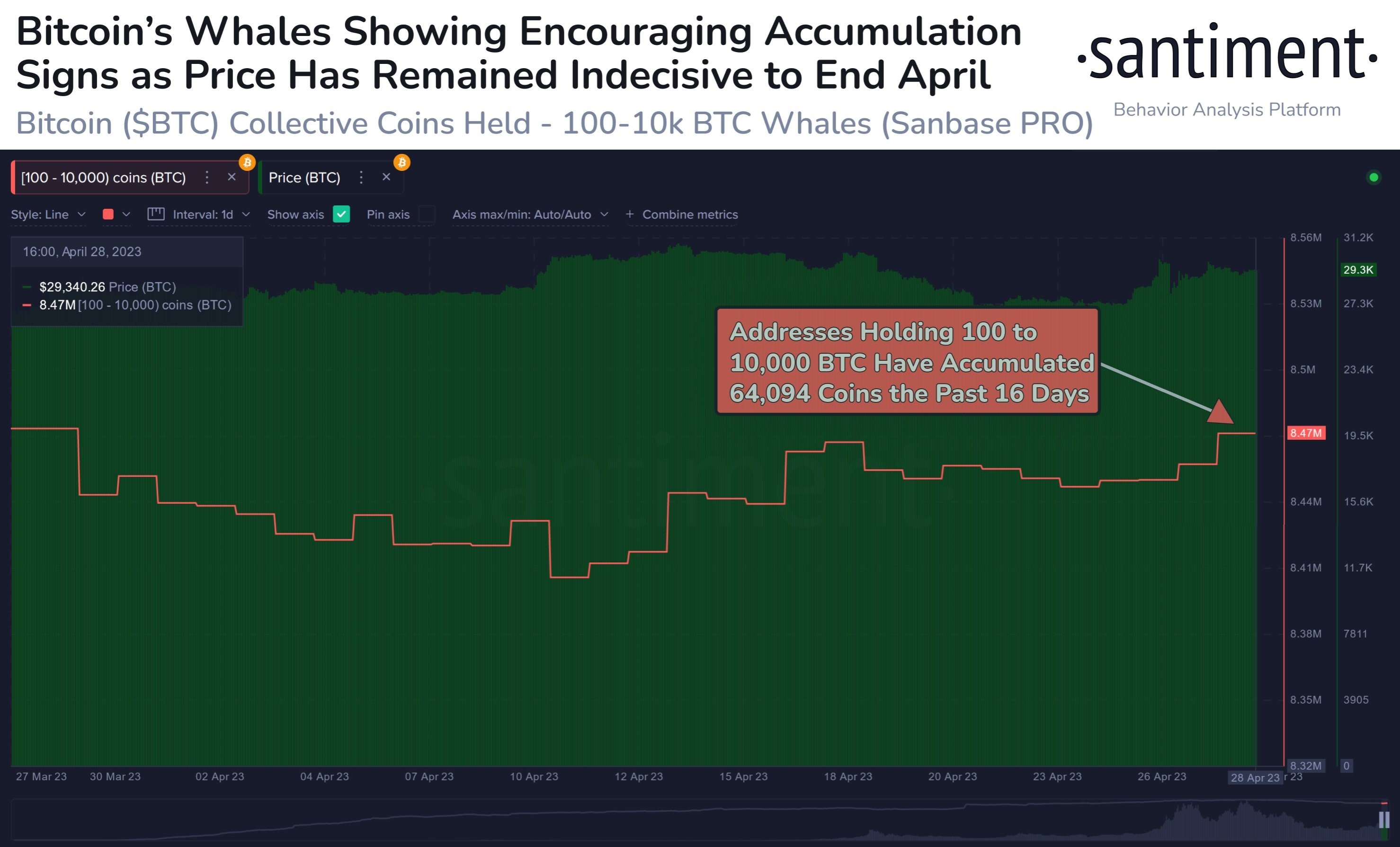
Their re-accumulation of a higher number of BTC than they had sold on 11 April underscores a bullish view from this group of whales even as the price of BTC appears to be lacking any upside catalyst to the average retail trader, who is getting more bearish and disinterested.
A check on crypto social volume shows that retail trader interest is declining and turning bearish, as can be seen in the below sentiment heatmap.
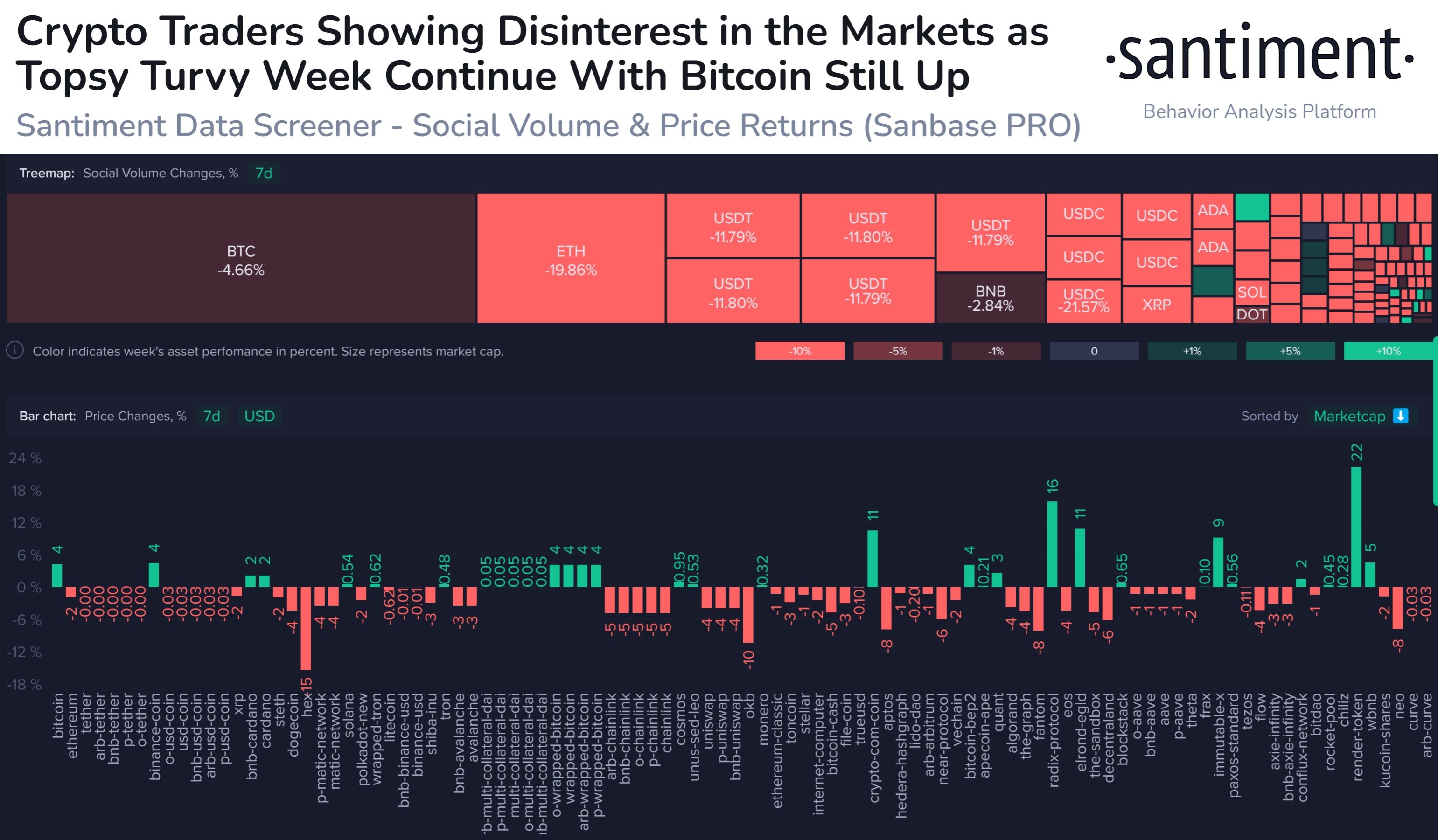
While this may not necessarily mean that the market could spring a surprise climb up anytime soon, this divergence between whale and retail trader sentiment should not be ignored, especially when the long-term metrics for BTC has remained bullish.
BTC Long-Term holder SOPR shows recovery intact
Despite the recent pullback, the BTC long-term holder SOPR is still climbing steeply, in line with previous cycles when a sustained price recovery was in progress. Hence, while the current retreat may appear to be ominous to the untrained eye, it is but a natural part of the ebb and flow of a normal recovery trajectory.
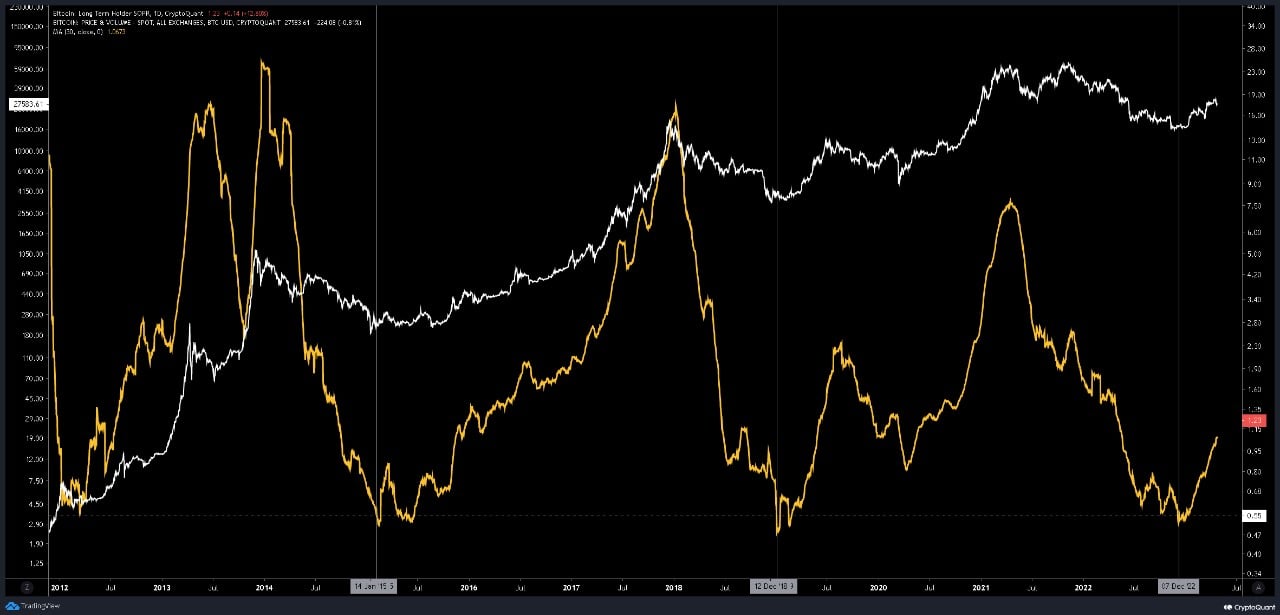
With BTC and ETH prices not able to eke out a direction with conviction yet, altcoins have suffered even more, with the lack of interest by traders clearly seen in the price action of most altcoins, which merely drifted lower over the week without any spark.
SOL bucks altcoin bust by rising 10%
SOL however, showed signs of life after its price managed to put in a gain of around 10%, which is a large gain under the current circumstance.
The rise in the price of SOL could be due to Helium completing its migration from its own blockchain to Solana.
Helium founders and backers see potential for Solana to unlock additional use cases around the Helium network, one of which may be facilitated by a mass-scale NFT mint tied to the migration. The Helium network plans to allow up to 1 million node operators to each mint an NFT to represent itself by moving over to Solana. As of the time of writing, more than 640,000 of such NFTs have been minted, which is increasing the adoption of SOL.
DOT and KSM see rising development activities
Other than Solana, there are other altcoins that have improving fundamentals despite a lackluster price action. Over the past weeks, three altcoins in particular, have seen a steady increase in their development activities. This can be seen by their increasing number of github commits over the past 30 days. The three coins are DOT, KSM and ADA.
Traders may want to put these names on their radar or accumulate on weakness to await for the time to eventually come for altcoins to shine.
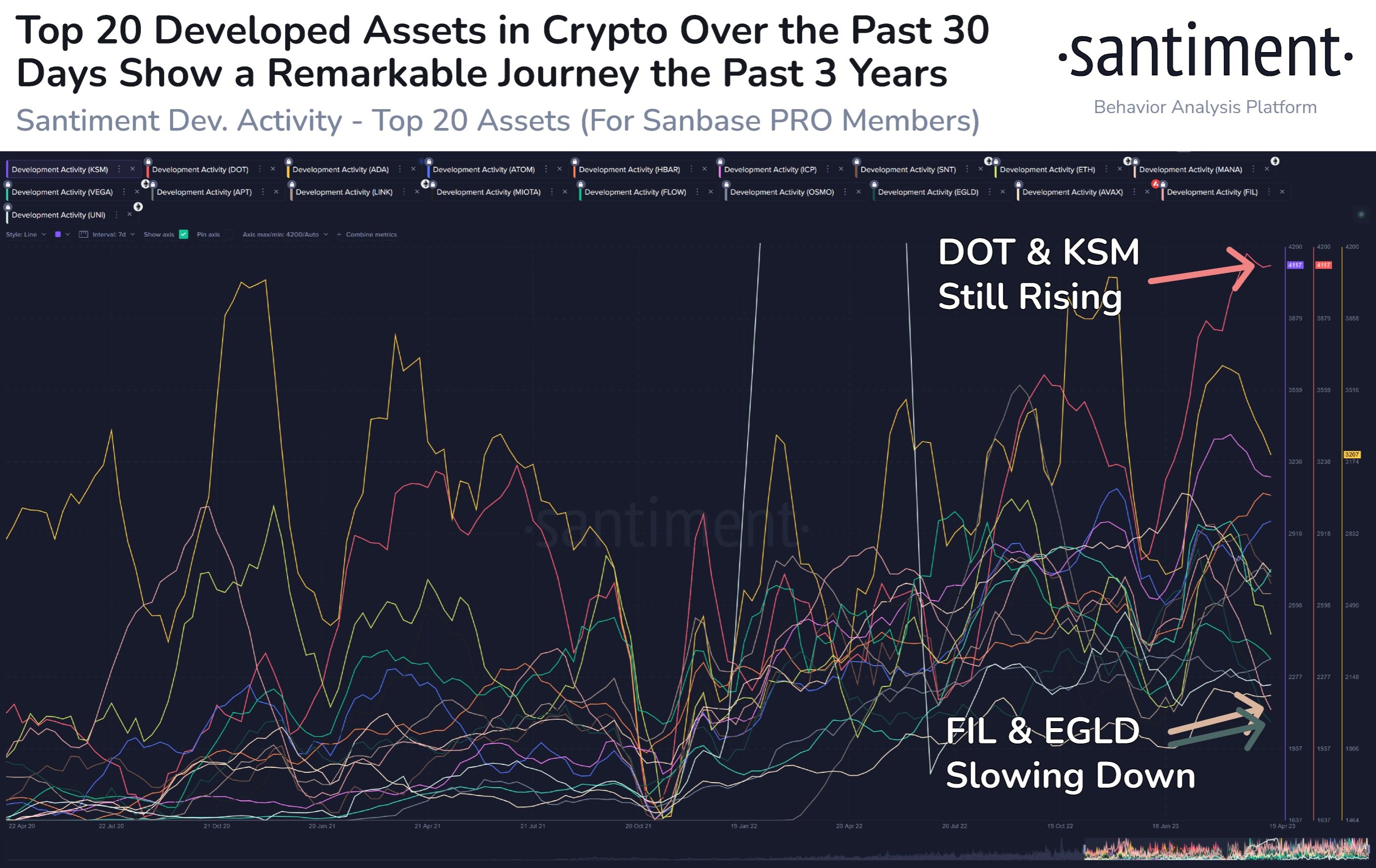
US GDP missed, but dollar rose instead
As for traditional markets, the US GDP rose 1.1% annually in 1Q23, lower than the 2% market participants were expecting, and markedly lower from the 2.6% in the last quarter of 2022. However, the dollar rose instead as traders expect the Fed to remain hawkish in this Wednesday’s Fed meeting, especially after the PCE index came in slightly hotter than anticipated, posting a gain of 4.6% year-over-year against consensus expectation of 4.5%.
The strength in the dollar put commodities on the backseat, with Gold and Silver trading flat all of last week and Oil losing around 1.4%. As the new week begins, the dollar is continuing to gain upward momentum, causing precious metals and oil to retreat another half a percent.
The outlier was the stock market. Despite expectations of a hawkish Fed, US stocks rose to put a strong end to the week and also for the month of April. In fact, April was the best month for the Dow and S&P since January.
The Dow finished April 2.5% higher, the S&P 500 logged a 1.5% monthly gain, while the Nasdaq only ended the month a tad higher. On a weekly basis however, the Nasdaq saw the largest gain of 1.3%, in what was considered Big Tech’s marquee earnings week. The Dow and S&P 500 each finished the week about 0.9% higher as most earnings released over the week beat expectations.
This week, even though more companies will be reporting, the key driving force of the market will be the Fed interest rate decision and press conference, which will take place on Wednesday. With expectations of a hawkish Fed, any less hawkish talk from the Fed chief could potentially spur the markets higher.
Before the Fed meets though, Tuesday will see the Reserve Bank of Australia decide on their interest rates while the European Central Bank will also be deciding theirs a day after the Fed meets, on Thursday.
Elsewhere, the Bank of Japan’s first policy meeting last Friday under new chief Ueda turned out just as everyone had expected – no change in policy. The new chief even commented that the policy board would not hesitate to ease further if the economic situation warranted it, which was more dovish than market participants had anticipated. As a result, the yen weakened drastically after the new dovish take was revealed by the new BoJ chief.
After all the central bank actions, this week will be capped off by the release of the April US non-farm employment data on Friday. With such an eventful week ahead, traders may want to be prepared for heightened volatility and interesting surprises.
The content provided here is for informational purposes only. It is not intended as personal investment advice and does not constitute a solicitation or invitation to engage in any financial transactions, investments, or related activities. Past performance is not a reliable indicator of future results.
The financial products offered by the Company are complex and come with a high risk of losing money rapidly due to leverage. These products may not be suitable for all investors. Before engaging, you should consider whether you understand how these leveraged products work and whether you can afford the high risk of losing your money.
The Company does not accept clients from the Restricted Jurisdictions as indicated in our website/ T&C. Some services or products may not be available in your jurisdiction.
The applicable legal entity and its respective products and services depend on the client’s country of residence and the entity with which the client has established a contractual relationship during registration.




